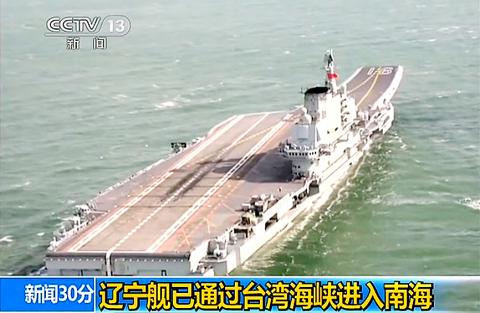The Ministry of National Defense yesterday confirmed that the Chinese aircraft carrier Liaoning passed through the Taiwan Strait yesterday morning — without crossing its median line — en route to the South China Sea, reiterating that the ministry had monitored the entire passage.
The voyage has drawn attention from Taiwan’s military and the international community amid rising tension over China’s demarcation of an air defense identification zone (ADIZ) in the East China Sea on Saturday.
Beijing’s East China Sea ADIZ overlaps with those of Japan, Taiwan and South Korea in a region marked by territorial disputes over the Diaoyutai Islands, claimed by Taiwan, China and Japan, and Ieodo, a South Korean-controlled submerged rock, which China also claims.

Photo: CNA
The carrier entered Taiwan’s ADIZ at about 10:30am on Wednesday and maintained a course approximately 14 nautical miles (26km) west of the median line of the Taiwan Strait before leaving Taiwan’s ADIZ at about 4am yesterday morning, ministry spokesman Major General David Lo (羅紹和) said.
“Taiwan’s surveillance and reconnaissance system, as well as several naval vessels and air force fighter jets, monitored the fleet’s entire passage through the Strait,” Lo said.
China’s Xinhua news agency reported early yesterday morning that the Liaoning, escorted by two guided missile destroyers, the Shenyang and Shijiazhuang, and two guided missile frigates, the Yantai and Weifang, had passed through the Strait on its way to a training mission in the South China Sea.
The voyage through the Strait took about 10 hours, the agency reported, adding that the Liaoning, China’s first and only aircraft carrier, left its home port of Qingdao in Shandong Province on Tuesday for a scientific and training mission.
The Liaoning, bought from Ukraine and refurbished in China, was commissioned last year and has been sent to the South China Sea for the first time.
Responding to the situation, Democratic Progressive Party Legislator Tsai Huang-liang (蔡煌瑯) yesterday urged President Ma Ying-jeou (馬英九) to lodge a protest with Beijing.
“Otherwise, the Taiwan Strait will become a Chinese inland sea in the future,” Tsai said, adding that Taiwan should side with its democratic allies over the situation.
Chinese Nationalist Party (KMT) Legislator Lin Yu-fang (林郁方) said China’s decision to send the carrier through the Taiwan Strait instead of cruising along Taiwan’s east coast hinted at Beijing’s backpedaling from its previously hawkish position on the ADIZ issue.

CHAOS: Iranians took to the streets playing celebratory music after reports of Khamenei’s death on Saturday, while mourners also gathered in Tehran yesterday Iranian Supreme Leader Ayatollah Ali Khamenei was killed in a major attack on Iran launched by Israel and the US, throwing the future of the Islamic republic into doubt and raising the risk of regional instability. Iranian state television and the state-run IRNA news agency announced the 86-year-old’s death early yesterday. US President Donald Trump said it gave Iranians their “greatest chance” to “take back” their country. The announcements came after a joint US and Israeli aerial bombardment that targeted Iranian military and governmental sites. Trump said the “heavy and pinpoint bombing” would continue through the week or as long

TRUST: The KMT said it respected the US’ timing and considerations, and hoped it would continue to honor its commitments to helping Taiwan bolster its defenses and deterrence US President Donald Trump is delaying a multibillion-dollar arms sale to Taiwan to ensure his visit to Beijing is successful, a New York Times report said. The weapons sales package has stalled in the US Department of State, the report said, citing US officials it did not identify. The White House has told agencies not to push forward ahead of Trump’s meeting with Chinese President Xi Jinping (習近平), it said. The two last month held a phone call to discuss trade and geopolitical flashpoints ahead of the summit. Xi raised the Taiwan issue and urged the US to handle arms sales to

BIG SPENDERS: Foreign investors bought the most Taiwan equities since 2005, signaling confidence that an AI boom would continue to benefit chipmakers Taiwan Semiconductor Manufacturing Co’s (TSMC, 台積電) market capitalization swelled to US$2 trillion for the first time following a 4.25 percent rally in its American depositary receipts (ADR) overnight, putting the world’s biggest contract chipmaker sixth on the list of the world’s biggest companies by market capitalization, just behind Amazon.com Inc. The site CompaniesMarketcap.com ranked TSMC ahead of Saudi Aramco and Meta Platforms Inc. The Taiwanese company’s ADRs on Tuesday surged to US$385.75 on the New York Stock Exchange, as strong demand for artificial intelligence (AI) applications led to chip supply constraints and boost revenue growth to record-breaking levels. Each TSMC ADR represents

State-run CPC Corp, Taiwan (CPC, 台灣中油) yesterday said that it had confirmed on Saturday night with its liquefied natural gas (LNG) and crude oil suppliers that shipments are proceeding as scheduled and that domestic supplies remain unaffected. The CPC yesterday announced the gasoline and diesel prices will rise by NT$0.2 and NT$0.4 per liter, respectively, starting Monday, citing Middle East tensions and blizzards in the eastern United States. CPC also iterated it has been reducing the proportion of crude oil imports from the Middle East and diversifying its supply sources in the past few years in response to geopolitical risks, expanding